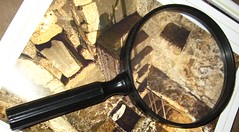Finally, the fun stuff: techniques for making sure your clues and foreshadowing are in there, but don’t attract too much attention from your reader that you’re telegraphing the pass.
Burying clues is all about framing: mentioning the object or information in plain sight, but in light of something more important so that the reader doesn’t think, “Ah, this is out of place/overly conspicuous/waaay too innocent looking—it must mean something.”
The first way we’ll discuss burying clues I’m calling “using framing with scene goals.” Scene goals are the POV character’s “mission” going into the scene. These goals should be fairly obvious, and may even be stated: “He had to get that folder from her before she looked inside,” “If I didn’t find out what the assignment was, I was toast,” etc.
 So the POV character comes into the scene focused on this goal—maybe a little too focused, in fact. Maybe so focused that we use this to our advantage. As Jack Bickham explains (emphasis mine):
So the POV character comes into the scene focused on this goal—maybe a little too focused, in fact. Maybe so focused that we use this to our advantage. As Jack Bickham explains (emphasis mine):
We know that the viewpoint character is strongly motivated toward a specific, short-term goal essential to his long-term quest when he enters the scene. Therefore, he will tend to be preoccupied with this goal throughout the scene. In fiction, as in real life, people tend to interpret everything in the frame of reference of their preoccupation of the moment. This is why it’s sometimes possible to make the wildest excursions inside the conflict appear to have relevance: The viewpoint character will inevitably interpret almost anything as relating back to the goal; you can show his line of thinking in an internalization, and so drag the seeming excursion far afield back into apparent relevance.
—Scene & Structure p 86-87
When our characters are so focused on this goal, we can use that focus to help the character (and thus the reader) dismiss something that might obviously be a clue. “Oh, he’s just hanging around because he needs to get the assignment, too.”
The scene goal tempers how a character sees material clues. They can explain them away easily: “Oh, that paperwork is on her desk—good! She’s been busy. She hasn’t had a chance to look inside the folder.”
Or they can just barely notice them—just enough to warrant a mention, but we have a MISSION here, people, and we are not going to get sidetracked!
What do you think? Have you ever had a character so focused on a scene goal that they led a reader away from a clue?
Photo by Candie_N


This is cool! Thanks Jordan
Love this concept. I like to orchestrate foreshadowing so that it’s not too obvious and this is a great tip.